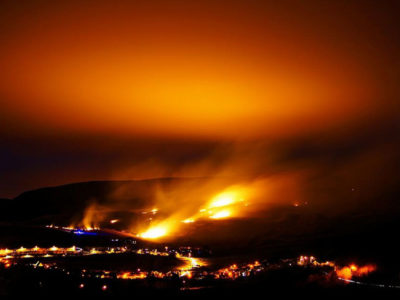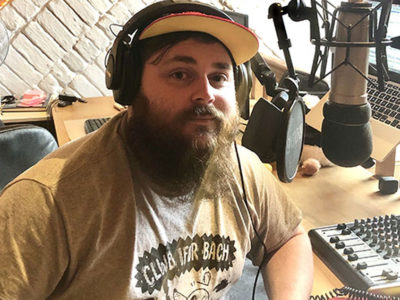Dr Adam Behr, Knowledge Exchange Research Associate at the Live Music Exchange, was happy to answer questions before the conference.
What do you hope to achieve from this conference?
Dr. Adam Behr: What we hope to achieve from this conference in general is to open, or at least, expand channels of communication between academics, musicians, live music business people and policy makers.
There’s research into live music, and of course academic courses that pertain to it, and hopefully events like this will provide a space for academics to find out what it is that employers and industry bodies feel they need from graduates and courses to best address current skill gaps. Likewise, this event will provide a forum for people whose livelihoods revolve around live music to engage with the public bodies that affect it.
How do you think personally live music in Wales can be saved?
Speaking personally, this is a matter of perception as well as a matter of infrastructure-both addressing a seeming reluctance on the part of agents to book gigs in Wales-as opposed to, say, Bristol-and at the same time looking at the problem of a blockage in the live music chain of mid-size venues. That’s actually a problem beyond Wales, but one of the concerns of the Live Music Exchange is certainly to look at the chain of progression for acts from grassroots to large-scale venues and I think encouraging local and national government, as well as business, to look at how best to support not just music venues themselves but awareness of them and infrastructure relating to them-like transport links to and from-might help to preserve and promote a secure chain of spaces for Welsh musicians.
Do you think Cardiff’s Swn Festival was successful in promoting local music and local venues? And do you think we should have more music festivals in Wales featuring Welsh music?
My sense is that it’s possibly a bit too early to gauge the long-term success of Swn festival in promoting Welsh music and venues beyond Wales, although I’m looking forward to hearing from promoter John Rostron about his perception of it at the conference in November. It certainly seems to have been a success on the ground. Aligning with the Welsh Music Prize definitely seems to have encouraged media coverage over the last couple of years.
As for more music festivals featuring Welsh music-this is a question that musicians and promoters in any small nation like Wales have to face and it involves negotiating a few factors-namely whether the intended audience is domestic or further afield. There’s always a balance between singing in Welsh and attempting to reach a wider audience-promoting identity on one hand and maximising accessibility on the other
It’s been a tricky year for festivals, smaller ones at any rate, in the UK as a whole so I wonder whether the conditions are right for expansion there. Having said that, Festival No.6 at Portmeirion seems to have had a successful debut.
Perhaps it’s a matter of looking at how live music in Wales can work alongside the broader promotion of Wales as a tourist and travel destination and to see how the promotion of Welsh culture can be integrated into that.
This event follows one that was held in Leeds, below is Paul Carr’s paper at Leeds.
The Live Music Exchange in Cardiff will hold a conference: “Supporting Live Music in Hard Times” on Saturday 10 November between 9am and 5pm.
The conference will be held in the Zen room, in the ATRium building, at the University of Glamorgan.
The one-day conference will discuss what is being done to support live music in Wales through policy and skills, bringing together a mix of people passionate about the future of live music to attempt to find the answer.
Dr Adam Behr, Knowledge Exchange Research Associate at the Live Music Exchange, said, “Hopefully collaboration between the Live Music Exchange and Glamorgan’s Centre for the Study of Media and Culture in Small Nations will encourage a wider conversation.”
Tickets are available: £10 or £5 for concessions.
Dr Adam Behr, Knowledge Exchange Research Associate at the Live Music Exchange, was happy to answer questions before the conference.
What do you hope to achieve from this conference?
Dr. Adam Behr: What we hope to achieve from this conference in general is to open, or at least, expand channels of communication between academics, musicians, live music business people and policy makers.
There’s research into live music, and of course academic courses that pertain to it, and hopefully events like this will provide a space for academics to find out what it is that employers and industry bodies feel they need from graduates and courses to best address current skill gaps. Likewise, this event will provide a forum for people whose livelihoods revolve around live music to engage with the public bodies that affect it.
How do you think personally live music in Wales can be saved?
Speaking personally, this is a matter of perception as well as a matter of infrastructure-both addressing a seeming reluctance on the part of agents to book gigs in Wales-as opposed to, say, Bristol-and at the same time looking at the problem of a blockage in the live music chain of mid-size venues. That’s actually a problem beyond Wales, but one of the concerns of the Live Music Exchange is certainly to look at the chain of progression for acts from grassroots to large-scale venues and I think encouraging local and national government, as well as business, to look at how best to support not just music venues themselves but awareness of them and infrastructure relating to them-like transport links to and from-might help to preserve and promote a secure chain of spaces for Welsh musicians.
Do you think Cardiff’s Swn Festival was successful in promoting local music and local venues? And do you think we should have more music festivals in Wales featuring Welsh music?
My sense is that it’s possibly a bit too early to gauge the long-term success of Swn festival in promoting Welsh music and venues beyond Wales, although I’m looking forward to hearing from promoter John Rostron about his perception of it at the conference in November. It certainly seems to have been a success on the ground. Aligning with the Welsh Music Prize definitely seems to have encouraged media coverage over the last couple of years.
As for more music festivals featuring Welsh music-this is a question that musicians and promoters in any small nation like Wales have to face and it involves negotiating a few factors-namely whether the intended audience is domestic or further afield. There’s always a balance between singing in Welsh and attempting to reach a wider audience-promoting identity on one hand and maximising accessibility on the other
It’s been a tricky year for festivals, smaller ones at any rate, in the UK as a whole so I wonder whether the conditions are right for expansion there. Having said that, Festival No.6 at Portmeirion seems to have had a successful debut.
Perhaps it’s a matter of looking at how live music in Wales can work alongside the broader promotion of Wales as a tourist and travel destination and to see how the promotion of Welsh culture can be integrated into that.
This event follows one that was held in Leeds, below is Paul Carr’s paper at Leeds.




